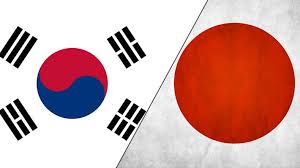
A local supplier in South Korea that makes a critical chemical in the chip manufacturing process has been asked by South Korea's Samsung Electronics and SK Hynix to ramp up production so that the companies are able to create a safeguard for any possible production disruptions because of an export curb by Japan, claimed multiple reports – many quoting an official at the supplier.
Earlier this month, Japan announced putting restrictions of the export to South Korea of three critical materials that are used for the manufacturing of chips and display screens. This has unnerved companies like Samsung and SK Hynix in South Korea because they depend on the imports from Japan for production and fear that the export curb would hamper their production.
The materials are used for making chips that are used in most of the smartphones as well as a material found in displays in smartphones. The micro chips that are manufactured in South Korea are used by companies like Apple Inc and Huawei Technologies Co and any production hampering could append the global supply of microchips.
"They are checking almost every day to secure more supplies from us," said the official at Foosung Co. The company makes hydrogen fluoride to both the two chip giants. The company added that the chipmakers offered to run the quality tests for its product.
Last week, South Korean president said that there are chances of prolongation of the export curb imposed by Japan on key materials used by South Korean technology firms and had assured that his government would try and reduce their reliance on Japanese suppliers and would be making sharp increases in spending to do so.
There were no comments available from Samsung and SK Hynix.
South Korea was removed from a list of countries with which minimal restriction on trade is conducted by Japan. Instead Japan has issued an order that mandates that export shipment of photoresist and other key materials to South Korea would have to done under a special permission from Japanese authorities every time. The measure by Japan was made as a part of a long standing dispute between the two countries that has its roots in the brutal Japanese annexation and colonial rule of the Korean Peninsula during the Second World War. A recent verdict against Japanese corporations to compensate South Korean plaintiffs for forced labor during the Second World War by a South Korean court had sparked the latest row.
A very large portion of the materials that the South Korean companies makes use of to manufacture chips and displays are imported from Japan even though China accounts for a portion of the demand for hydrogen fluoride in the country.
Analysts and market experts say that it is almost impossible possible to stockpile hydrogen fluoride because of its highly toxic nature.
According to a report published earlier by South Korean media Yonhap Infomax, supply of shipment of hydrogen fluoride from South Korean firms has been requested to be boosted by both Samsung and SK Hynix so that their dependence on imports from Japan is reduced.
(Source:www.economictimes.com)
Earlier this month, Japan announced putting restrictions of the export to South Korea of three critical materials that are used for the manufacturing of chips and display screens. This has unnerved companies like Samsung and SK Hynix in South Korea because they depend on the imports from Japan for production and fear that the export curb would hamper their production.
The materials are used for making chips that are used in most of the smartphones as well as a material found in displays in smartphones. The micro chips that are manufactured in South Korea are used by companies like Apple Inc and Huawei Technologies Co and any production hampering could append the global supply of microchips.
"They are checking almost every day to secure more supplies from us," said the official at Foosung Co. The company makes hydrogen fluoride to both the two chip giants. The company added that the chipmakers offered to run the quality tests for its product.
Last week, South Korean president said that there are chances of prolongation of the export curb imposed by Japan on key materials used by South Korean technology firms and had assured that his government would try and reduce their reliance on Japanese suppliers and would be making sharp increases in spending to do so.
There were no comments available from Samsung and SK Hynix.
South Korea was removed from a list of countries with which minimal restriction on trade is conducted by Japan. Instead Japan has issued an order that mandates that export shipment of photoresist and other key materials to South Korea would have to done under a special permission from Japanese authorities every time. The measure by Japan was made as a part of a long standing dispute between the two countries that has its roots in the brutal Japanese annexation and colonial rule of the Korean Peninsula during the Second World War. A recent verdict against Japanese corporations to compensate South Korean plaintiffs for forced labor during the Second World War by a South Korean court had sparked the latest row.
A very large portion of the materials that the South Korean companies makes use of to manufacture chips and displays are imported from Japan even though China accounts for a portion of the demand for hydrogen fluoride in the country.
Analysts and market experts say that it is almost impossible possible to stockpile hydrogen fluoride because of its highly toxic nature.
According to a report published earlier by South Korean media Yonhap Infomax, supply of shipment of hydrogen fluoride from South Korean firms has been requested to be boosted by both Samsung and SK Hynix so that their dependence on imports from Japan is reduced.
(Source:www.economictimes.com)














